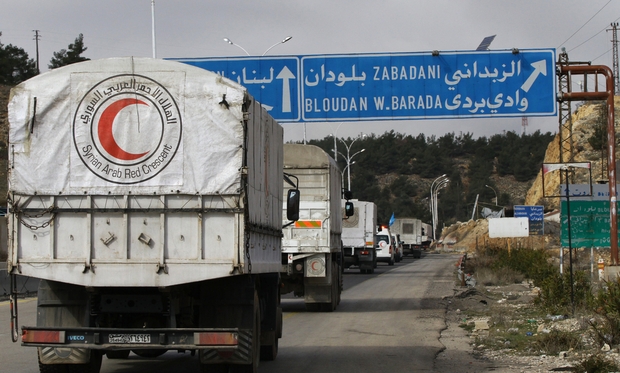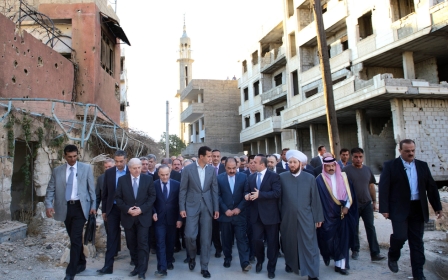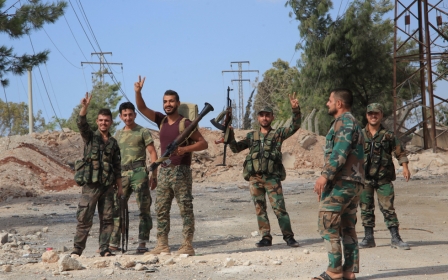Aid groups continue to suspend UN cooperation despite ceasefire deal

A coalition of aid groups providing aid for seven million Syrians in Syria and in refugee camps bordering the country have said that the US-Russia ceasefire deal will not change its stance of non-cooperation with UN agencies in Syria.
The announcement comes after 73 groups signed an open letter to the UN expressing its frustration at how the Syrian government had gained “significant" and “substantial” influence over the UN’s relief effort in Syria.
Late on Friday the US and Russia both came to a ceasefire deal that will lead to the Syrian Air Force being grounded and withdrawal of Syrian government troops from supply routes near the rebel stronghold of Aleppo.
The 73 aid groups who signed the open letter suspending its cooperation with the UN in Syria welcomed the ceasefire in the hope that aid will reach parts of Syria that have been besieged by the Syrian government for months.
Speaking on behalf of the Syrian aid coalition, Dr Kais Dairi from the Syria Relief Network told Middle East Eye: "We welcome the ceasefire but it will not affect our agreement to suspend all cooperation with UN agencies based in Damascus.
"The ceasefire is a political solution that will have limited impact on a humanitarian level. We are not asking for the UN to stop the war. We are asking the UN to be vocal about what is happening in Syria. Not just in Damascus areas that are besieged. To say loud and clear and call out who is violating what and this applies to all warring parties - not only the regime."
He also added: “The ceasefire will have some humanitarian implications that will enable us to push some aid into places like Aleppo. Something that we have been demanding for a long time.”
Key demands in the letter by the coalition of aid groups include withdrawal from the UN's information sharing programme and calls for the UN to be more transparent about its operations in Syria.
The UN has come under heavy criticism for its aid operations in Syria and discussions with the Syrian government - criticism it describes as "unfair".
MEE earlier this year revealed how the UN had removed the words "siege" and "besiege" in a fundraising document in a bid to downplay the humanitarian crisis emerging in besieged areas at the request of the Syrian government.
Dr Ahmad Tarakji, President of the Syrian American Medical Society (SAMS) said that the letter had come after months of lobbying by various aid groups to help the UN in Syria run an operation that is transparent and fair to all warring parties.
"We tried to help the UN be more transparent and fair to ensure its reputation is not tarnished in Syria but we got nowhere," said Tarakji.
Numerous investigations by the Guardian also showed that millions of dollars were being funnelled to people closely associated with the Syrian President Bashar al-Assad, including businessmen whose companies are under US and EU sanctions.
Notable signatories of the open letter condemning the UN in Syria include the Syrian Civil Defense Force (White Helmets) and SAMS - both groups who have had their facilities targeted by the Syrian and Russian Air Force.
Numerous rebel groups who previously condemned the ceasefire deal “backed the truce deal” hours before the ceasefire was due to take place.
In a statement to Reuters, the High Negotiations Committee (HNC) said that despite “reservations over the ceasefire deal”, the group “as a whole agree” with the terms of the ceasefire.
The HNC described the move by rebel groups to collectively support the ceasefire deal as a means to “cancel out any possibility of internal confrontation” between the various rebel groups.
Terms of the ceasefire deal mean that if peace holds for about nine days, Syria’s air force will be permanently grounded and this will then lead to joint US-Russian airstrikes commencing against Islamic State and Jabhat Fateh al-Sham (formerly al-Qaeda-affiliated al-Nusra Front)
Russia however on Monday said it would continue attacking areas controlled by the IS and JFS.
Assad earlier today told state media that he vowed to retake all of Syria.
New MEE newsletter: Jerusalem Dispatch
Sign up to get the latest insights and analysis on Israel-Palestine, alongside Turkey Unpacked and other MEE newsletters
Middle East Eye delivers independent and unrivalled coverage and analysis of the Middle East, North Africa and beyond. To learn more about republishing this content and the associated fees, please fill out this form. More about MEE can be found here.




